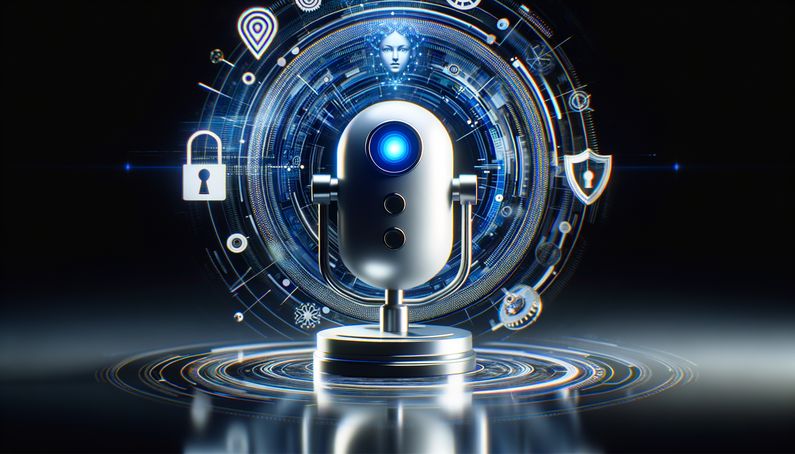
Apple's $95 Million Settlement Over Siri Privacy Violations
In a significant development that underscores the ongoing tension between technological innovation and user privacy, Apple has agreed to a $95 million settlement over allegations that its Siri voice assistant recorded private conversations without user consent. This legal battle, which has been unfolding since 2019, was sparked by a report from The Guardian that revealed Apple contractors were inadvertently listening to sensitive user conversations through Siri recordings. These recordings were often triggered unintentionally by sounds or phrases that Siri misinterpreted as its activation command, “Hey Siri.” The lawsuit accused Apple of violating user privacy by recording conversations without consent and sharing the data with third-party advertisers, a claim that starkly contrasts with Apple’s public commitment to privacy. The settlement, while not an admission of wrongdoing by Apple, marks a pivotal moment in the tech giant’s efforts to address privacy concerns and restore user trust. (The Guardian, Black Enterprise, NBC News)
Background of the Siri Privacy Lawsuit
Origins of the Lawsuit
The Siri privacy lawsuit originated in August 2019, following a report by The Guardian, which alleged that Apple contractors were privy to sensitive and confidential user conversations through Siri recordings. These recordings were reportedly triggered unintentionally by phrases or sounds other than the intended activation phrase, “Hey Siri.” The whistleblower who contributed to the report revealed that contractors overheard private discussions, including medical information, business transactions, and personal conversations. This revelation sparked concerns about Apple’s commitment to privacy and led to the filing of a class-action lawsuit. (The Guardian)
The lawsuit alleged that Apple violated user privacy by surreptitiously recording conversations without consent and sharing the data with third-party advertisers. This was seen as a direct contradiction to Apple’s long-standing public stance on prioritizing user privacy.
Allegations Against Apple
The core allegations revolved around the claim that Siri-enabled devices, such as iPhones, iPads, and Apple Watches, recorded conversations even when users did not intentionally activate the virtual assistant. This was attributed to accidental activations caused by sounds or phrases that Siri misinterpreted as its wake command.
Plaintiffs in the lawsuit argued that Apple not only recorded these conversations but also shared the data with advertisers to create targeted advertisements. For instance, users reported receiving ads related to topics they had discussed privately, such as medical procedures or shopping preferences. One plaintiff alleged that they received an advertisement for a surgical procedure shortly after discussing it with their doctor. (Black Enterprise)
The lawsuit also claimed that Apple failed to adequately inform users about these practices, violating their expectations of privacy.
Timeline of Events
2014–2019: Accidental Activations and Data Collection
The issues with Siri’s accidental activations reportedly began as early as September 2014. Despite a software update designed to ensure Siri only activated upon hearing “Hey Siri,” users continued to experience unintended activations. These incidents persisted until 2019, when The Guardian published its investigative report.
During this period, Apple allegedly collected audio recordings from Siri-enabled devices without user consent. These recordings were reportedly reviewed by third-party contractors to improve Siri’s functionality. However, the contractors often overheard sensitive and private information, raising ethical and legal concerns. (Information Age)
2019: Public Outcry and Legal Action
The Guardian report in 2019 triggered widespread public criticism of Apple’s privacy practices. In response, Apple issued a rare public apology, acknowledging that it had not fully lived up to its privacy ideals. The company also announced changes to its Siri-related practices, including the suspension of its contractor-based grading program and the introduction of new privacy controls.
Shortly after the report, the Wood Law Firm filed a class-action lawsuit against Apple in a federal court in Oakland, California. The lawsuit accused Apple of unlawfully recording user conversations and sharing the data with third parties without consent. (Consumer Affairs)
2024: Settlement Negotiations
After years of legal proceedings, Apple agreed to settle the lawsuit in December 2024. The proposed settlement, valued at $95 million, was filed in the same Oakland federal court. While Apple denied any wrongdoing, the company stated that it chose to settle to avoid prolonged litigation and move forward. (NBC News)
Key Legal Arguments
Plaintiffs’ Claims
The plaintiffs argued that Apple’s actions violated several privacy laws, including the California Invasion of Privacy Act (CIPA). They claimed that Apple:
- Recorded user conversations without explicit consent.
- Shared these recordings with third-party advertisers, leading to targeted ads.
- Failed to adequately disclose these practices to users.
The lawsuit also highlighted the ethical implications of Apple’s actions, particularly given the company’s public commitment to privacy.
Apple’s Defense
Apple consistently denied the allegations, asserting that Siri was designed with user privacy in mind. The company argued that:
- Siri recordings were used solely to improve the virtual assistant’s functionality.
- Data collected from Siri was anonymized and not linked to individual users.
- No recordings were sold to advertisers or used to create marketing profiles.
Despite these claims, Apple acknowledged that its contractor-based grading program had raised privacy concerns and took steps to address the issue in 2019.
Settlement Details
The $95 million settlement is intended to compensate users who owned Siri-enabled devices between 2014 and 2019. Eligible users may receive up to $20 per device, depending on the number of claims filed. The settlement also includes provisions for attorneys’ fees and other legal expenses. (Forbes)
Apple has not admitted any wrongdoing as part of the settlement. However, the company has implemented several changes to its Siri-related practices, including:
- Deleting all Siri audio recordings collected before October 2019.
- Introducing new permission prompts for Siri audio recordings.
- Conducting an internal review of its Siri-related practices.
These measures are aimed at preventing similar incidents in the future and restoring user trust.
Broader Implications
The Siri privacy lawsuit has significant implications for both Apple and the tech industry as a whole. It highlights the challenges of balancing innovation with user privacy and underscores the importance of transparency in data collection practices.
For Apple, the lawsuit represents a rare blemish on its reputation as a privacy-focused company. While the settlement allows the company to move forward, it also serves as a reminder of the need for vigilance in protecting user data.
For the tech industry, the case sets a precedent for how companies handle privacy violations and respond to user concerns. It also underscores the growing importance of regulatory oversight in the era of smart devices and artificial intelligence. (9to5Mac)
Details and Implications of the Settlement
Overview of the Settlement Terms
Apple has agreed to pay $95 million to settle allegations that its Siri voice assistant recorded private conversations without users’ consent. The settlement applies to U.S.-based users who owned Siri-enabled devices between September 17, 2014, and December 31, 2024. Eligible users can claim up to $20 per device, with a maximum of five devices per individual, amounting to a total of $100 per claimant. The settlement fund also covers legal fees and administrative expenses, which could account for approximately 30% of the total amount. (Forbes)
Eligibility Criteria and Claim Process
To qualify for compensation, users must attest under oath that they experienced unintentional Siri activations that led to private conversations being recorded. Devices eligible for claims include iPhones, iPads, Apple Watches, MacBooks, HomePods, iPod touches, and Apple TVs purchased during the specified period. Claimants must submit their applications by May 15, 2025, via a dedicated website that Apple is expected to launch within 45 days of the court’s approval of the settlement. (Ars Technica)
Allocation of the Settlement Fund
The $95 million settlement fund will not be distributed entirely to affected users. Approximately 30% of the fund, or $28.5 million, is expected to go toward legal fees, with an additional $1.1 million allocated for administrative expenses. The remaining amount will be used to compensate eligible claimants, with the final payout per device potentially increasing if fewer claims are submitted. (CNN)
Privacy Concerns and Allegations
The lawsuit alleges that Siri inadvertently recorded private conversations when activated unintentionally, often triggered by phrases resembling “Hey, Siri.” These recordings reportedly included sensitive information, such as medical discussions and private conversations, which were allegedly shared with third parties, including advertisers. The controversy gained traction in 2019 when reports revealed that Apple contractors overheard portions of these recordings during Siri’s grading process. (Los Angeles Times)
Apple’s Response and Privacy Enhancements
Apple has denied any wrongdoing but agreed to the settlement to avoid prolonged litigation. The company emphasized its commitment to user privacy, stating that Siri data has never been used to build marketing profiles or sold to third parties. In 2019, Apple introduced measures to enhance Siri’s privacy, including making audio recording retention an opt-in feature. The settlement also requires Apple to provide clearer disclosures about managing Siri settings to prevent unintentional data collection. (BleepingComputer)
Conclusion
The $95 million settlement reached by Apple in response to the Siri privacy lawsuit represents a critical juncture in the ongoing discourse surrounding user privacy and data protection in the tech industry. While Apple has consistently denied any wrongdoing, the settlement allows the company to move forward without the protracted litigation that could further damage its reputation. This case highlights the challenges faced by tech companies in balancing the advancement of artificial intelligence technologies with the imperative to protect user privacy. Apple’s commitment to implementing new privacy measures, such as deleting pre-2019 Siri recordings and introducing clearer user permissions, reflects a broader industry trend towards greater transparency and accountability. As the tech landscape continues to evolve, this settlement serves as a reminder of the importance of maintaining user trust and the potential consequences of failing to do so. The implications of this case extend beyond Apple, setting a precedent for how privacy violations are addressed and underscoring the need for robust regulatory oversight in the era of smart devices. (Forbes, Ars Technica, Los Angeles Times)
References
- The Guardian, 2025, Apple agrees to $95 million settlement over Siri privacy lawsuit
- Black Enterprise, 2025, Apple settles Siri privacy lawsuit for $95 million
- NBC News, 2025, Apple to pay $95 million to settle lawsuit accusing Siri of eavesdropping
- Forbes, 2025, Apple Siri eavesdropping payout: Here’s who’s eligible and how to claim
- Ars Technica, 2025, Apple agrees to pay $95M, delete private conversations Siri recorded
- Los Angeles Times, 2025, Apple to pay $95 million to settle lawsuit over Siri privacy mishap



